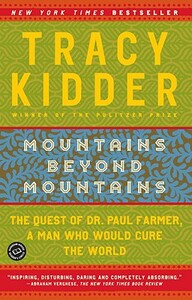Take a photo of a barcode or cover
emotional
informative
inspiring
reflective
medium-paced
I found Dr Paul Farmer's commitment to public health and helping all people so inspirational. His journey was well-written, as I stay engaged as he traveled the world. I admire his dedication, persistence, and determination to do what he believes is right, especially focusing on people who needed him the most. He not only changed the lives of the patients he helped, but also the doctors he worked with. And ultimately, by caring about the individual patient and recognizing their needs, he made structural change happen.
informative
inspiring
medium-paced
I feel like I didn't really understand this book. Some of the arguments that the book makes (e.g., the argument that "cost-effective" thinking is no good, or the argument that trekking into the mountains to visit individual patients is a better use of Paul Farmer's time than doing health-policy work that could save many more lives) just didn't seem very convincing, as though they wouldn't hold much water if delivered into the talons of a rigorous logician. That being said, this book has had a bigger impact on my worldview than any book I've read in recent memory. Beware: this is a book that might make you re-evaluate your goals, question your values, and ask yourself whether your current passions are really worth being passionate about. But although it may seed your mind with feelings of doubt and guilt, it will leave you feeling inspired overall.
adventurous
hopeful
informative
inspiring
reflective
medium-paced
An inspiring story of Paul Farmer and his international work in serving the poor. Paul’s passion is contagious. I hope we can all defend a cause as whole-heartedly as he does.
challenging
emotional
informative
reflective
medium-paced
I think that when I was reading I didn’t know that this was a five star book, but once I finished it stuck with me so much that I knew it had to be! I never knew about Paul Farmer, or really much about world medicine and infectious disease. This book is such a solid and engaging read on Paul, his work, his life, and now his legacy. His drive to create an environment where no health crisis goes untreated is so amazing and is seriously what is needed in the world. He has done so much but is still so focused on individuals and hasn’t lost sight of what matters. I think everyone should read this probably.
My main conflicts with this book come from being in international development and having conflicts with the sector in general. Otherwise its an approach perspective of public health.
Farmer is the kind of rare human being who knows everyone, does everything, and barely sleeps, so of course his life begs to be profiled. And yet, as is his and his staffers' refrain throughout the book, other people should not try to emulate him. His life is worth reading about not so it can inspire you to be him, but so you can understand global health through a different lens than the usual cost-benefit perspective usually put forward. I love the way he draws guidance from liberation theology and the Catholic Church's teachings on a preferential option for the poor. His philosophy stems from treating the person in front of you because they are ill, even if it doesn't seem worth it from an economic standpoint. There is a lot to reflect on and argue about that comes out of this book and Farmer's approach to public health.
I'm not sure why it took me so long to get through this book or why I didn't find it compelling enough to keep picking up, because it's definitely a well written and well organized book. I did find Kidder's chapter endings fairly abrupt, and the book itself ended rather abruptly. Despite the optimism of the afterword, it wasn't clear that Partners in Health has developed a sustainable model, which was a problem running through the book. It's not clear that the organization will survive past the death of its founder, and I would have liked to see, if not an answer to that question, more reflections from the author on what the future holds.
On the whole, this is worth a read, and I think it will make a great discussion point for my book club.
I'm not sure why it took me so long to get through this book or why I didn't find it compelling enough to keep picking up, because it's definitely a well written and well organized book. I did find Kidder's chapter endings fairly abrupt, and the book itself ended rather abruptly. Despite the optimism of the afterword, it wasn't clear that Partners in Health has developed a sustainable model, which was a problem running through the book. It's not clear that the organization will survive past the death of its founder, and I would have liked to see, if not an answer to that question, more reflections from the author on what the future holds.
On the whole, this is worth a read, and I think it will make a great discussion point for my book club.
challenging
hopeful
informative
inspiring
medium-paced






